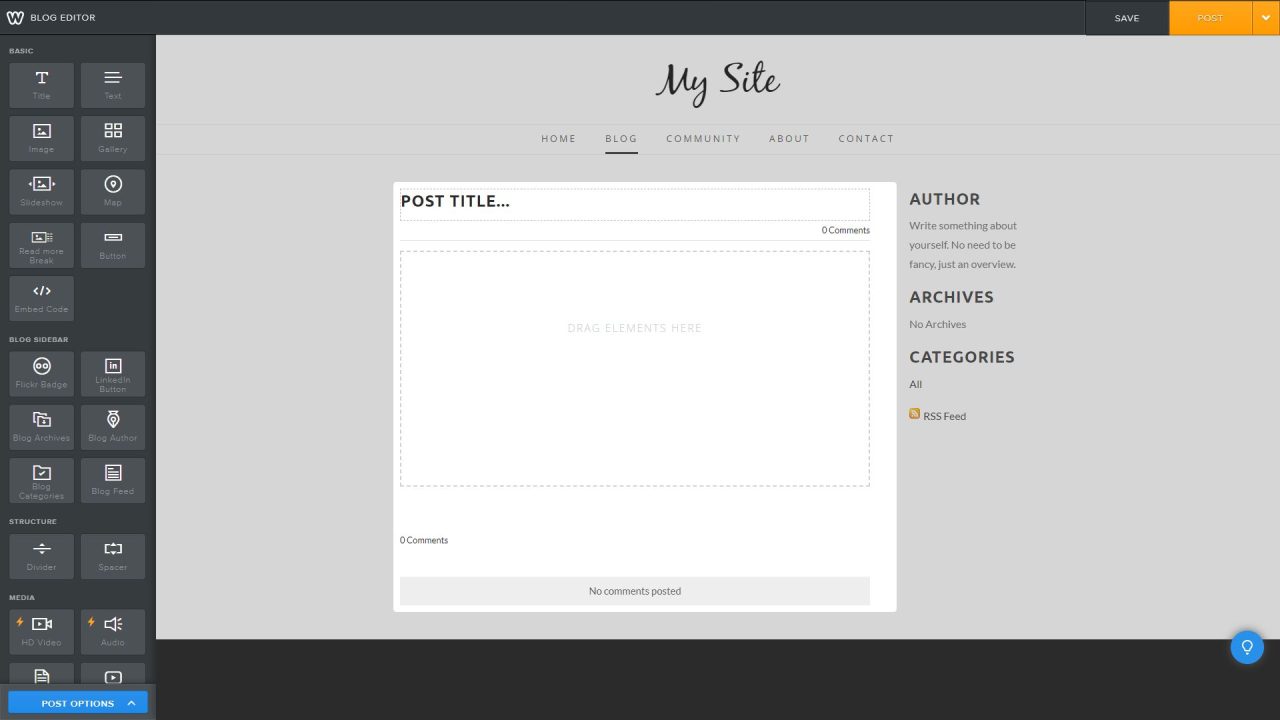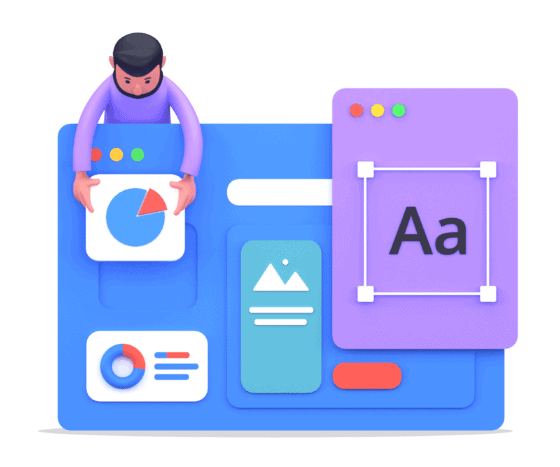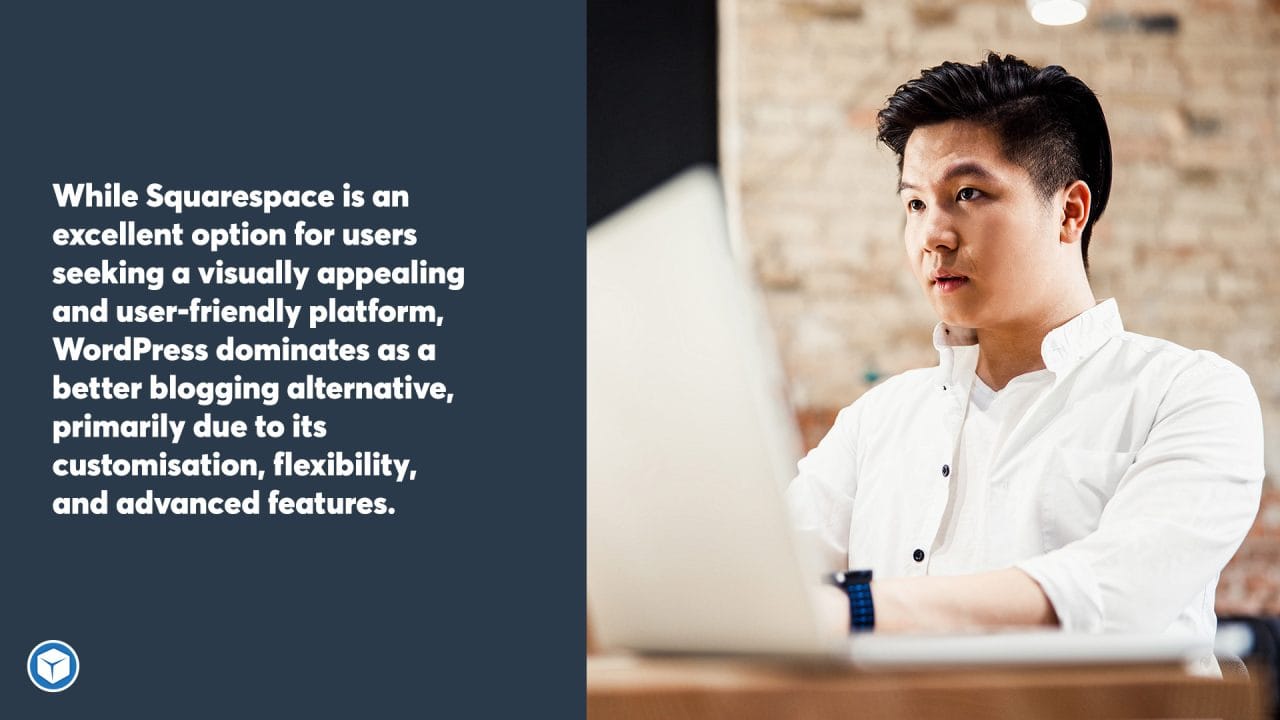
Choosing the right platform for building your own website can be challenging, especially with so many website builder platforms available in the market. When looking at options, there is possibly no rivalry greater than Weebly vs WordPress, and for good reason; both are powerhouse hosting providers, however, each has its own set of advantages and drawbacks. This article intends to discuss the features, ease of use, and capabilities of both platforms to help you make an informed decision. No matter what you are looking to achieve from a personal website, be it blogging tools, or basic ecommerce features, you’ll find the hosting provider best suited for your needs.
Here is a quick breakdown of the WordPress Weebly equation. Weebly is an easy-to-use, drag-and-drop website builder, targeted at users who are looking for a quick and straightforward way to launch a modern website, blog, or online store. Ideal for beginners and small businesses, Weebly offers a range of essential tools and features to get a website up and running with minimal effort, without requiring technical expertise.
On the other hand, WordPress is a powerful and flexible content management system, used by a vast percentage of websites across the internet. It is well-suited for those who wish to build feature-rich, dynamic websites and scale them up over time. WordPress themes and unique WordPress plugins are plentiful, which allow users to create customised websites, tailored to their specific needs and interests. While it might have a steeper learning curve for beginners, the possibilities are endless with WordPress.
Table of Contents

Understanding the Basics
Understanding how to compare Weebly and WordPress is key to knowing which is best for you, based on your personal website needs as well as your budget. Many emerging site owners look to keep initial costs low, which is where extras such as free domain or free domain registration, free plan and free SSL security can really come in handy, not to mention being able to control the website, edit and update in-house.
Weebly Site vs WordPress Site Overview
Weebly and WordPress are two popular platforms for creating websites. Weebly is a website builder with a drag-and-drop interface, making it easy for users with no technical background to create and launch websites quickly. On the other hand, WordPress is an open-source content management system (CMS) that offers more flexibility and customisation options for website creation.
Weebly offers:
- Simplicity and ease of use
- Drag-and-drop interface
- Built-in security features and hosting
WordPress provides:
- More flexibility and customisation options
- A large community and ecosystem for premium theme and plugin use
- Advanced site-building features for experienced users
Website Builders and Platforms
To better understand the differences between Weebly and WordPress, it’s important to know the difference between website builders and platforms.
Website Builders
Website builders, like Weebly, are tools designed to help beginners create websites without requiring web development skills. These builders often include pre-designed templates, drag-and-drop functionality, and a range of built-in features to make it easy for users to create an aesthetically appealing and functional website.
Platforms
Platforms, like WordPress, are more advanced systems which provide greater control and flexibility for the creation and management of WordPress websites. These platforms often require some level of technical expertise, but the end result is a highly customisable and scalable website that can grow with the user’s needs.
In conclusion, Weebly and WordPress serve different purposes depending on the user’s needs. Weebly is more suited for beginners who want a simple and quick way to launch a website, while a WordPress site is a better choice for those who require more advanced features and customisation options.
Ease of Use
Getting Started
When comparing Weebly and WordPress, it’s important to consider the ease of use, especially for beginners. Weebly is known for its straightforward setup process, allowing users to create a website quickly and efficiently. With its simple signup process, users can choose a template, customise it with the drag-and-drop editor, and publish their website within minutes.
On the other hand, WordPress also provides an easy-to-follow setup process but might require a bit more time and effort, particularly for individuals with no technical background. The initial process includes setting up a domain and hosting plan, installing the WordPress software, and choosing a theme.
Editor and User Interface
The editor and user interface are essential components in evaluating ease of use. Weebly offers a user-friendly and intuitive interface with drag-and-drop functionality. This feature enables users to move elements like text, images, and buttons easily. It also has a well-organised dashboard, allowing users to manage their website content, pages, and settings in one place.
Platform Interface Highlights
Weebly:
- User-friendly interface
- Drag-and-drop editor
- Efficient dashboard
WordPress:
- Flexible editor with Gutenberg or Classic editor
- Greater control over website elements
- More customisation options
WordPress offers the Gutenberg editor, a block-based system that allows users to arrange content in blocks. This may initially seem more complex than the drag-and-drop editor of Weebly. However, the Gutenberg editor provides more flexibility and control over the layout and design of the website. There is also an option to use the Classic editor, providing a familiar experience for those used to traditional word processing software.
In the battle of Weebly vs WordPress, both have different advantages when it comes to ease of use. Weebly is better suited for individuals who want a simple and efficient way to create their website, while a WordPress website offers more advanced customisation options and greater control over website elements.
Design and Customisation
When comparing Weebly and WordPress platforms, design and customisation play a key role in selecting the best choice. This section highlights “Themes and Templates” and “Customisation Options” to evaluate the design features of each platform.
Themes and Templates
Weebly provides a wide range of templates that cater to various industries. These templates are pre-designed, making it easy for users to create a visually appealing website. The templates are responsive, adjusting according to different devices. On the other hand, WordPress themes boast an extensive collection (both free and premium) with diverse design options to suit any industry, style or functionality requirements.
Customisation Options
When it comes to customisation, Weebly and WordPress both provide users with the ability to make unique modifications to their site. Weebly offers a user-friendly, drag-and-drop editor that simplifies the design process and enables users to easily customise their chosen template. This feature is suitable for beginners but may be restrictive for users seeking advanced customisations.
WordPress, in contrast, is a powerful content management system (CMS) that offers almost unlimited customisation options. These customisations can range from changing colours, fonts and layouts, to implementing plugins that can enhance the website’s functionality. This flexibility makes WordPress an ideal choice for users who want to create highly customised websites. However, the higher degree of customisation options might require some technical knowledge.
If you’re looking for Customisation Options expect a learning curve of some magnitude with any platform. Weebly has a user-friendly drag-and-drop editor, but the sacrifice is limited advanced customisations. WordPress sites offer almost unlimited design options but require technical skill to execute well.
Features and Functionality
In this section, we will discuss the features and functionality of Weebly vs WordPress to help you understand which platform suits your needs better. Let’s start with the available tools and plugins.

Tools and Plugins
Weebly offers a variety of built-in tools, including security features and hosting. It has a limited selection of free and paid applications, which can be suitable for users who don’t require extensive customisation.
On the other hand, WordPress provides a more comprehensive range of features, such as online stores, contact forms, galleries, portfolios, SEO, and more. While these features might not come pre-installed, plugins offer tons of options. With thousands of plugins available, WordPress users can find specific tools to tailor their websites to fit their requirements.
E-commerce Capabilities
When it comes to ecommerce plugin options, each has its own set of features and functionalities. Weebly is more suitable for beginners or small websites, while WordPress ecommerce offers a versatile and flexible solution for advanced users and businesses requiring more customisation and functionality.
Weebly is primarily a drag-and-drop website builder with built-in ecommerce tools, making it an attractive option for beginners or users with small online stores. Some offerings include product management, payment processing, and shipping options.
WordPress, as a content management system, is highly flexible, allowing various types of websites, including ecommerce. By utilising the WooCommerce plugin, users can build a full-featured online store with more complex functionalities and features than with Weebly. These may include product variations, custom shipping rules, advanced payment gateways, and more.
SEO and Marketing
Both website builders offer practical solutions for SEO and marketing, with Weebly providing a more straightforward approach for beginners, and WordPress presenting a more powerful and customisable platform for advanced users.
SEO Tools and Features
SEO tools developed to refine your search engine optimisation can’t be overlooked, they are essential when it comes to your website’s visibility. Because of this, you’ll see advanced SEO features and offerings from both platforms.
WordPress offer a range of SEO tools and features to help improve the visibility of a website in search engine results. Weebly provides built-in SEO features, such as customisable meta descriptions, and URLs. Additionally, Weebly offers a simplified approach to image optimisation with alt tags and responsive images that adjust to various screen sizes.
WordPress shines in the area of SEO tools through its extensive plugin ecosystem. With plugins like Yoast SEO and All in One SEO, users gain access to numerous advanced SEO features and customisation options. WordPress allows for complete control over site elements that can improve a website’s SEO performance, such as heading tags, sitemaps, schema markup, and canonical URLs. If you get stuck, WordPress support is there to draw on.
Marketing and Social Media
Marketing and social media integration are essential for website promotion, which is why Weebly and WordPress provide easy and direct options for connecting with popular social media platforms.
Weebly offers email marketing solutions, including newsletter sign-up forms that easily integrate with email marketing platforms like Mailchimp. This allows users to grow their email list and develop targeted email campaigns effortlessly. Weebly also provides simple social media integration, enabling users to add social media buttons and share their content across various platforms.
In contrast, WordPress boasts a vast array of marketing plugins that cater to various aspects of digital marketing, such as email marketing, lead generation, and social media sharing. Plugins like MailPoet, OptinMonster, and Social Media Share Buttons & Social Sharing Icons extend the functionality, allowing users to customise and manage their marketing efforts more effectively.
Hosting and Domain Options
Before you install WordPress or start your Weebly website you need to lay out your hosting and domain options. Different costs and sign-ups are needed and can get tricky if you put the cart before the horse, especially if the domain name you have your heart set on isn’t available. Also, consider how much support you might need. If you just need blogging Weebly, you might feel more confident going it alone, however, more advanced ecommerce features or premium apps might require a dedicated support team.
Hosting Services
When deciding between Weebly and WordPress, it is essential to consider the hosting services they offer. Weebly provides a fully managed hosting environment, which means that all website server requirements are taken care of by the platform. Users can easily manage their websites without worrying about site security, performance, or maintenance.
On the other hand, WordPress is a self-hosted platform that requires you to find your own web hosting service. There are plenty of companies offering hosting services tailored for WordPress websites. Some of these well-known hosting providers include:
- Bluehost
- SiteGround
- Kinsta
With a self-hosted WordPress website, you are responsible for managing and maintaining the server, which might be more challenging for inexperienced users, but offers more flexibility.
Domain Name Management
Domain name management is also an essential aspect of building a website. When it comes to custom domain names. Weebly and WordPress offer the option to use your own domain with their respective platforms which is handy if you are already set up and registered or you need custom URLs.
Weebly: The platform offers a free subdomain (e.g., yourwebsite.weebly.com) for its users. However, to use a custom domain, which can look more professional with custom URLs, you can purchase the domain directly from Weebly or point the domain you purchased from another domain registrar to your Weebly site.
WordPress: Since WordPress is a self-hosted solution, you can easily use a custom domain for your website. You have the freedom to purchase a domain from any domain registrar and point it to your WordPress site hosted on your chosen web hosting provider.
Both platforms enable users to utilise custom domain names for their websites. Weebly offers a more straightforward solution for domain management as it provides hosting and domain registration within its platform. In contrast, WordPress provides more flexibility when it comes to selecting a domain registrar and web hosting service but involves more management responsibilities.
Move your existing website to a better platform – where you remain in control.
Ready to level up your online presence? Our tailored WordPress migration service can make it happen. Contact us to start your migration project.

Performance and Security
Website Loading Speed
When considering performance, website loading speed is a vital factor. Weebly and WordPress both offer decent loading speeds, but there are some differences. Weebly’s platform is a drag-and-drop website builder, which typically results in faster loading times due to its optimised and simplified structures. With a more streamlined approach, Weebly allows users to create efficient, fast-loading websites with minimal effort.
WordPress plugins are one of the biggest features of this content management system, supporting a wide range of customisations. This flexibility can lead to slower website loading times if proper optimisation measures are not taken. However, with appropriate attention to caching, image optimisation, and usage of performance-enhancing plugins, WordPress websites can achieve comparable speeds to Weebly.
Security Features
Security is another essential aspect when choosing between Weebly and WordPress. Weebly has built-in security features, providing a more straightforward, hands-off approach for its users. Weebly takes care of SSL certificates, secure hosting, and other security updates, so the website owners can focus on creating and maintaining their content.
WordPress, being a self-hosted platform, requires users to take a more active role in managing the security of their websites. This includes regular software updates, installing SSL certificates, and choosing secure hosting options. While this allows for more control and customisation, it can be more time-consuming and require a level of technical know-how to keep websites secure.
In conclusion, both Weebly and WordPress offer performance and security options that cater to different needs and user preferences. Weebly provides an easy-to-use, secure platform for website building with faster loading times. In contrast, WordPress offers greater customisation and flexibility but may demand more involvement and maintenance from its users.
Support and Maintenance
Customer Support
Weebly provides a comprehensive array of customer support options, including a knowledge base, community forums, and email support. They also offer phone support for users subscribed to their premium plans, enabling quick assistance during business hours.
On the other hand, A WordPress site, being built on an open-source platform, does not have a centralised customer support system. However, it boasts a massive community of users and developers who are available to help through online forums, blogs, and tutorials. Additionally, for premium themes and plugins, dedicated support is often available from their respective creators.
Website Maintenance
Weebly essentially handles the majority of website maintenance tasks on behalf of its users. This includes software updates, security patches, and server management, resulting in a hassle-free experience. However, it is the users’ responsibility to keep their content refreshed and update website themes as needed.
In contrast, maintaining a WordPress website requires a more hands-on approach. It is crucial for users to:
- Update WordPress software regularly.
- Keep their themes and plugins updated.
- Schedule regular backups to protect against data loss.
- Implement security measures such as SSL certificates and security plugins.
While WordPress may entail more effort with respect to maintenance, it ultimately provides greater control and flexibility for users who want to manage and maintain their own websites. Consider your own technical skill when making your choice to how confident you are with using tools like a WordPress editor, or chatting to WordPress developers via the WordPress support channels.
Pricing and Value
Cost Comparison
Weebly and WordPress offer different pricing structures for website building. WordPress is a free and open-source platform with additional expenses for hosting, premium WordPress themes, and plugins. The total cost can vary widely based on the resources needed. Weebly, on the other hand, provides tiered pricing plans with fixed costs for each plan. Let’s compare the costs:
WordPress Website
- Platform: Free (open-source)
- Hosting: Ranging from $5/month (economy) to $50/month (advanced)
- Themes: Free and premium available (Premium usually between $30-$100, one-time purchase)
- Plugins: Free and premium plugins available (Premium typically have one-time or recurring costs)
Weebly Account
- Free Plan: Limited features for basic website creation
- Premium Plans: Starting from $8/month to $55/month (billed annually)
- Themes: Both free and premium theme types are available, with premium themes ranging between $30-$100 (one-time purchase)
Value for Money
When considering value for money, it’s essential to evaluate the features and functionality each platform provides. WordPress is known for its versatility and extensive customisation options. The availability of thousands of free and premium plugins and themes makes it ideal for creative and experienced users who want complete control over their website.
Weebly is user-friendly, with a drag-and-drop website builder that simplifies the process for beginners. Although it offers fewer customisation options than WordPress, it includes features such as hosting, security, and eCommerce tools, making it an attractive option for small business owners or those starting their website journey.
The choice between a Weebly website or WordPress website depends on individual requirements, technical expertise, and budget. While WordPress offers extensive customisation options and the potential for lower initial costs, Weebly provides simplicity and an all-inclusive package for those seeking a straightforward website-building experience.

Weebly and WordPress for Different Users
Solutions for Bloggers
When it comes to blogging platforms, both a Weebly website and a WordPress site can deliver top-rated blogging capabilities. Both offer reliable options for different types of bloggers. Weebly blog provides a user-friendly drag-and-drop interface, making it a suitable choice for beginners who want to set up their blog posts quickly and efficiently. On the other hand, WordPress is known for its flexible and highly customisable nature, which allows more experienced bloggers to create unique and feature-rich blogs.
Options for Businesses
For businesses looking to build their websites, Weebly and WordPress offer distinct solutions. Weebly’s easy-to-use, drag-and-drop interface appeals to small- and medium-sized businesses that require a quick and simple online presence. Weebly’s focus on eCommerce also makes it an attractive choice for businesses planning to set up online stores.
WordPress, with its comprehensive content management system, is a better fit for businesses that require greater flexibility and customisability for their website. The vast array of themes and plug-ins offered by WordPress enables businesses to create more complex and feature-rich websites to cater to diverse customer needs.
Overall, both Weebly and WordPress cater to different user needs, with Weebly providing a simpler solution for bloggers and small businesses, while WordPress allows for greater customisation and expansion for experienced users and businesses requiring more advanced features.
Weebly vs WordPress – Final Thoughts
To determine the better option of Weebly vs WordPress, it’s essential to consider the unique needs of the users and the purpose of their websites.
For those prioritising ease of use and looking for a straightforward solution for creating websites or an online store, Weebly is a strong contender. It offers an intuitive drag-and-drop interface, which can be especially appealing for beginners or those who want to get a site up and running with minimal fuss. Weebly also provides a dedicated support team to assist users with any issues they might face, which adds a level of comfort for those who might not be as tech-savvy.
On the other hand, WordPress powers 43% of websites on the internet, is renowned for its flexibility, and is an excellent choice for those looking to optimise their site’s performance in search engines. With WordPress, users have direct access to powerful SEO tools like the Google Search Console, which can significantly enhance a website’s visibility and ranking. Additionally, WordPress’s open-source nature means that users have an extensive range of plugins and themes at their disposal, allowing for highly customised and scalable websites.
When weighing “Weebly vs WordPress,” it’s crucial to consider the long-term goals of your website. If you anticipate the need to scale your site, require extensive customisation, or want to have control over every aspect of your SEO strategy, WordPress might be the better option. However, if you value simplicity, ease of use, and quick setup without the need for in-depth technical knowledge, Weebly could be the way to go.
Remember, both platforms have their merits, and the best choice depends on your specific requirements, technical expertise, and the level of control you wish to have over your website’s design and functionality.
WordPress Weebly Comparison FAQs
If you’re considering transitioning from Weebly to WordPress, Chillybin’s top-notch Website Migration service is here to assist. Our team is dedicated to providing seamless migrations to ensure your transition is smooth and hassle-free.




